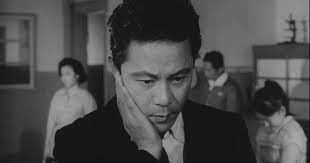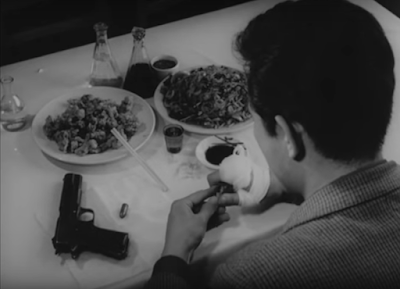Obaltan / Aimless Bullet (1961, South Korea, directed by Yu Hyun-mok)
Over the last 2 decades, contemporary Korean films have become much more well known in North America and easily available in various formats be it theatrical releases, DVD/Blu-Ray or streaming. The success of Bong Joon-ho, Park Chan-wook, Hong Sang-soo, Lee Chang-dong has ensured that their new films and works by other contemporary Korean directors have a good chance at getting North American distribution. On the other hand, Korean cinema from the 1950-60s isn’t as well-known or seen compared to other global cinema or even newer Korean films. Kim Ki-young’s 1960 classic film The Housemaid is the best known film from this period and that managed to find an audience after a 2008 restoration by the Korean Film Archive in association with The Film Foundation’s World Cinema Project and HFR-Digital Film laboratory. However, there are quite a few worthy Korean films from that 1960s period including Obaltan (Aimless Bullet), a film that is found on many all time best Korean films list and even topping some of those lists.
Aimless Bullet (also known as Stray Bullet) was not a commercial success upon its release in 1961 and was banned by the government due to its bleak depiction of events in South Korea. The post-war years in South Korea were tough on many fronts, especially economic growth, as the country tried to rebuild after the devastating Korean war. Yu Hyun-mok’s film brilliantly captures those hardships and struggles in a manner reminiscent of Italian neorealism. That is not a coincidence as director Yu Hyun-mok cited Vittorio De Sica’s Bicycle Thieves as an influence.
The film is shown from the perspective of Cheol-ho (Kim Jin-kyu) and his family, who are displaced North Koreans living in a Seoul Slum. Cheol-ho is an accounting clerk who can barely make ends meet, a point illustrated by his inability to pay for this persistent toothache. He has to provide for his mother, pregnant wife, daughter and younger siblings. Cheol-ho’s younger brother, Yong-ho (Choi Mu-ryong) is disabled by the war and has trouble finding a job despite being a decorated war veteran. Cheol-ho’s mother suffers from trauma and constantly shouts “Let’s go”, words which take on an ironic and painful meaning as the family has nowhere to go. The desperation of the family members to improve their lives leads them into a darker territory where they have to make some vital moral and ethical decisions.
Yu Hyun-mok expertly incorporates neorealism and genre elements, especially some film noir and crime elements (gangsters and a bank heist as an example). The film also tackles vital socioeconomic elements of Korean society in the Korean war’s aftermath which led to poverty, crime and general disillusionment. There is also a nod towards political elements such as the influence of US in the post-war rebuilding efforts. Some of the depiction of post-war society recalls early Akira Kurosawa, especially Drunken Angel (1948). Aimless Bullet also has some smart technical flourishes which provides a new entry point to assess Korean Cinema of the 1960s. However, it was not a film that I was aware of until it became available online a few years ago on the Korean Classic Film YouTube channel. This was a genuine discovery for me and I hope it can be the same for others.


